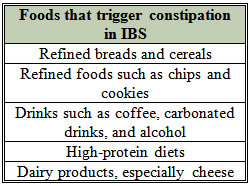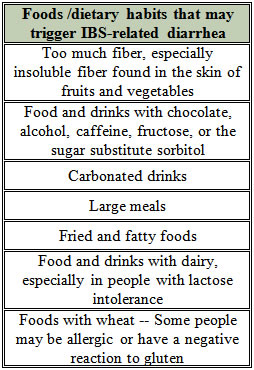Irritable Bowel Syndrome Natural Home Remedies
Doctors say that irritable bowel syndrome (IBS) has no cure. People with the condition will have it for the rest of their life. But it’s manageable condition. With appropriate strategies, you can keep the symptoms off. So a comprehensive treatment plan matters to deal with. How about natural ‘cures’ and home remedies? Do they work?
The good news, it doesn’t lead to the permanent damage to the bowel. But when the symptoms flare up, they can be very bothersome!
How is irritable bowel syndrome treated? Sometimes the exact cause of IBS is not know, making it harder to treat. But whatever it is, again it’s manageable!
For mild symptoms, lifestyle changes may be helpful enough. But your doctor can prescribe certain medicines if the symptoms get worse.
What to remember, there is no single formula for everyone since each case is different. So the treatment plan can vary, depending on several factors such as the underlying cause, symptoms, and the overall health of the patient.
Some common medications prescribed by doctor for IBS may include – according to Mayo Clinic:
- Over-the-counter medications for diarrhea. As the name suggests, it is purposed to ease and treat diarrhea symptom. One of common anti-diarrheal medicines is ‘Imodium’ or loperamide.
- Anticholinergic drugs! They are purposed to ease and treat painful bowel spasms (this symptom is often associated with activities of the autonomic nervous system). Anticholinergics may also help ease diarrhea, but they may make the constipation symptom get worse.
- Amitiza / Lubiprostone for severe constipation.
- Lotronex / Alosetron to help treat severe conditions of diarrhea-predominant IBS, particularly if the symptom doesn’t improve with other treatments.
And according to WebMD, there are also some medications that are still debatable because their potential side effects. Some of them are:
- Antidepressants! Pain from IBS symptoms can increase your risk of depression. For this reason, certain antidepressents (such as SSRI, tricyclic antidepressant, etc) may be used to control the risk of depression. But sometimes the use of certain antidepressants for IBS can provoke other symptoms such as constipation and drowsiness.
- Sometimes antibiotics may also be prescribed, especially if the problem has to do with bacterial infection.
In fact, there are a lot of patients with IBS find that their poor diet can provoke their IBS symptoms. So making adjustments in the diet may help too.
Interestingly, different foods may affect IBS in different ways. Some people with IBS develop bloating (excessive gas) and diarrhea after eating certain high-fiber foods or too much fiber, while others may don’t experience any change.
People with IBS may also be sensitive to lactose. For this reason, a trial of a lactose-free diet is worth a try. Also, regular exercise and stress management may help.
For the cases of IBS with constipation, the following are some foods that should be avoided:

Other things that may help:
- Keep hydrated – make sure you get plenty of fluid a day (about 8 glasses of water /day or make sure you have light or clear urine when you pee).
- Try with ground flaxseed! You can sprinkle it on cooked vegetables and salads.
- Full your diet with foods contains many sorbitol, however make sure you eat them in moderation! Prune juice and dried plums are some great choices of foods higher in sorbitol.
- Increase your fiber intake, but ensure you do it gradually! For instance, you can increase your fiber intake for about 2-3 grams /day until you get the regular consumption of fiber for about 20-35 grams /day. There are a lot of foods higher in fiber that you can explore. Beans, whole grain cereals & breads, fruits and vegetables are some excellent sources of high fiber.
- Ask your doctor whether you need to take some supplements, such as psyllium, corn fiber, Fibercon, and wheat bran (these supplements are commonly used to increase bowel movement).
Though these things are good to help ease constipation symptom, do these in moderation. For instance, too much consumption of fiber could be counterproductive.
Here is the table of some common culprits that potentially provoke IBS-related diarrhea:

Do also the the following prevention tips:
- Avoid foods with too high and too low temperatures, particularly in the same meals. For instance, you should not eat steaming hot soup with ice-cold water.
- Larger portions of meal are bad, so avoid them. This bad dietary habit also can put you at greater chance of weight gain.
- Still, keep hydrated!
- It’s much better to avoid drinking with meals – drink water for about 1 hour before & after your meals!
- Foods high in gas (such as cabbage, onions, and broccoli) should be restricted, because they can worsen bloating and diarrhea.
- Foods high in soluble fiber are recommended, but again make sure you consume them in moderation. Brown rice, dried fruits, whole wheat breads, and barley are some good sources of soluble fiber. These foods can add bulk to your colon to prevent spasms.
- If you’re allergic to certain foods, discuss with a doctor for more advice!
How about exercise? We all agree that regular exercise is important to keep you fit. It is good for your overall health. But does it work for IBS symptoms?
If you are an inactive individual, start your exercise with some mild and moderate kind of workouts – then increase this gradually! Ask your doctor first if you have other health conditions!
All people can have stress and feeling of worry, at least once in a while. But if you have IBS, it’s very important to manage your stress! Psychological problems may also provoke your IBS flare-up.
Here are a few helpful tips to deal with stress
- Do more activities with fun – such as taking a walk, listening a song you love, reading, taking a vacation in the weekend, etc!
- Build a good relationship with others! This is not only helpful to keep you motivated but also good to release your stress.
- Take some complementary therapies if necessary, such as yoga, relaxation therapy, etc.
- Plan ahead on what you want to do! For instances, map your route when driving, so thus you will know the locations of bathrooms. If you think your IBS can make you late for certain event, go earlier.
Are there any alternative treatments and therapies to treat irritable bowel syndrome? These include:




IRRITABLE BOWEL SYNDROME…Pine Nut Oil.
Pine nut oil for IBS? it’s hard to find adequate scientific evidence on this!